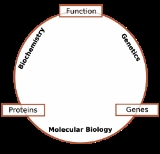
Molecular biology
Overview
Molecular biology is the branch of biology that deals with the molecular basis of biological activity. This field overlaps with other areas of biology
and chemistry
, particularly genetics
and biochemistry
. Molecular biology chiefly concerns itself with understanding the interactions between the various systems of a cell
, including the interactions between the different types of DNA
, RNA
and protein biosynthesis
as well as learning how these interactions are regulated.
Writing in Nature
in 1961, William Astbury
described molecular biology as
Researchers in molecular biology use specific techniques native to molecular biology (see Techniques section later in article), but increasingly combine these with techniques and ideas from genetics
and biochemistry
.
Biology
Biology is a natural science concerned with the study of life and living organisms, including their structure, function, growth, origin, evolution, distribution, and taxonomy. Biology is a vast subject containing many subdivisions, topics, and disciplines...
and chemistry
Chemistry
Chemistry is the science of matter, especially its chemical reactions, but also its composition, structure and properties. Chemistry is concerned with atoms and their interactions with other atoms, and particularly with the properties of chemical bonds....
, particularly genetics
Genetics
Genetics , a discipline of biology, is the science of genes, heredity, and variation in living organisms....
and biochemistry
Biochemistry
Biochemistry, sometimes called biological chemistry, is the study of chemical processes in living organisms, including, but not limited to, living matter. Biochemistry governs all living organisms and living processes...
. Molecular biology chiefly concerns itself with understanding the interactions between the various systems of a cell
Cell (biology)
The cell is the basic structural and functional unit of all known living organisms. It is the smallest unit of life that is classified as a living thing, and is often called the building block of life. The Alberts text discusses how the "cellular building blocks" move to shape developing embryos....
, including the interactions between the different types of DNA
DNA
Deoxyribonucleic acid is a nucleic acid that contains the genetic instructions used in the development and functioning of all known living organisms . The DNA segments that carry this genetic information are called genes, but other DNA sequences have structural purposes, or are involved in...
, RNA
RNA
Ribonucleic acid , or RNA, is one of the three major macromolecules that are essential for all known forms of life....
and protein biosynthesis
Protein biosynthesis
Protein biosynthesis is the process in which cells build or manufacture proteins. The term is sometimes used to refer only to protein translation but more often it refers to a multi-step process, beginning with amino acid synthesis and transcription of nuclear DNA into messenger RNA, which is then...
as well as learning how these interactions are regulated.
Writing in Nature
Nature (journal)
Nature, first published on 4 November 1869, is ranked the world's most cited interdisciplinary scientific journal by the Science Edition of the 2010 Journal Citation Reports...
in 1961, William Astbury
William Astbury
William Thomas Astbury FRS was an English physicist and molecular biologist who made pioneering X-ray diffraction studies of biological molecules. His work on keratin provided the foundation for Linus Pauling's discovery of the alpha helix...
described molecular biology as
Researchers in molecular biology use specific techniques native to molecular biology (see Techniques section later in article), but increasingly combine these with techniques and ideas from genetics
Genetics
Genetics , a discipline of biology, is the science of genes, heredity, and variation in living organisms....
and biochemistry
Biochemistry
Biochemistry, sometimes called biological chemistry, is the study of chemical processes in living organisms, including, but not limited to, living matter. Biochemistry governs all living organisms and living processes...
.
Unanswered Questions

